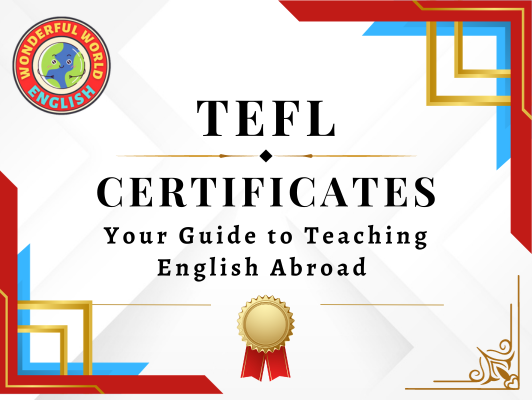Contents
Toggle
Meet David De’ Ath, founder, editor, and writer at Wonderful World English. With his extensive background as an English teacher, David provides valuable insights and practical tips on ESL for students and teachers alike.
A TEFL certificate is essential for individuals seeking to teach English as a foreign language.
This certification confirms that the holder possesses the necessary education and training to teach English to non-native speakers.
TEFL certificates are recognized internationally and can open up opportunities to teach in various countries around the globe, as well as online.
Selecting the right TEFL course is crucial as it must align with one’s career goals and meet the requirements of potential employers.
Courses range in length, depth, and mode of delivery, with some offering specialized training for different age groups or business English.
The curriculum covers language theory and grammar and equips prospective teachers with the practical skills and teaching methodologies necessary for success in the classroom.
Key Takeaways
- A TEFL certificate is required to teach English to non-native speakers.
- Course selection should align with career goals and employer standards.
- TEFL courses provide practical skills and essential teaching methodologies.
Understanding TEFL Certificates
TEFL certificates are essential qualifications for teaching English to speakers of other languages.
This section delves into what TEFL certification entails, differentiates between common industry acronyms, and underscores the significance of accreditation.
What is TEFL?
TEFL stands for Teaching English as a Foreign Language.
A TEFL certification equips individuals with the skills necessary to teach English effectively in a country where English is not the primary language.
This certification is often a prerequisite for securing English teaching positions abroad.
TEFL, TESOL, and CELTA: Decoding Acronyms
TEFL is often mentioned alongside other acronyms like TESOL (Teaching English to Speakers of Other Languages) and CELTA (Certificate in English Language Teaching to Adults).
While TEFL focuses on teaching non-native speakers in a country where English isn’t widely spoken, TESOL encompasses both non-native speakers in English-speaking countries and those abroad.
CELTA, on the other hand, is a specific brand of TEFL certification offered by Cambridge English, primarily targeted at adult learners.
For more information and insights into the differences between these three renowned qualifications, check out the guide below!
Related: CELTA vs. TEFL vs. TESOL: Which One is Best?
The Importance of Accreditation
Accreditation serves as a quality assurance indicator for TEFL programs.
Proper accreditation ensures the certification is recognized and valued internationally.
Aspiring English teachers should verify that a TEFL course is internationally accredited, which bolsters employability and affirms that the education provided meets certain standards.

Types of TEFL Certification
TEFL certifications vary in delivery method and focus, with options suited for different learning styles and teaching goals.
One can pursue certification entirely online, through in-person courses, or opt for a combination of the two.
Online TEFL Certificates
Online TEFL certificates provide the flexibility and convenience of training from any location with internet access.
They are ideal for those who have busy schedules or are looking for a more affordable option to become certified in teaching English as a foreign language.
Online TEFL courses typically offer a range of modules covering language teaching fundamentals and can be completed at the learner’s own pace.
In-Person TEFL Courses
In-person TEFL courses offer intensive training and hands-on teaching practice, which can be very valuable for new teachers.
These courses often take place at specific locations abroad or domestically and involve direct interaction with instructors and peers.
In-person training can be integral for those who prefer a structured and immersive learning environment.
Combined TEFL Courses
Combined TEFL courses offer the best of both worlds by integrating online theoretical learning with in-person practical training.
This approach allows one to study the fundamentals of teaching English online and then apply those concepts in a classroom setting through supervised practice.
Such courses are tailored for individuals looking for comprehensive training and online study flexibility.
TEFL Certification Requirements

TEFL certification is a crucial step for individuals aiming to teach English to speakers of other languages.
This section outlines the specific prerequisites and steps needed to obtain TEFL certification.
Qualifications
Prerequisites: Generally, individuals seeking a TEFL certification must be at least 18 years old.
Many programs require a high school diploma or GED equivalent.
While not always mandatory, possessing a bachelor’s degree can be a prerequisite for higher-level courses or for job placements abroad.
Certification Process
Steps to Certification:
- Research and select a reputable TEFL course provider.
- Ensure the course meets international standards for at least 100 hours of academic coursework and practical training.
- Complete the coursework, which typically includes language theory, pedagogy, and classroom management.
- Participate in practical teaching experiences, either in-class or online, to apply teaching concepts.
- After successful completion, receive the internationally recognized TEFL certificate.
Prospective TEFL candidates need to check the specific requirements, which might vary slightly from course to course or country to country.
Choosing a TEFL Course

When selecting a TEFL course, it’s crucial to evaluate the course content, the kind of job placement assistance offered, and the reputation of the TEFL course providers.
These factors greatly influence one’s readiness to teach English as a foreign language and the opportunities available after certification.
Course Content
TEFL courses should comprehensively cover teaching methodologies, language acquisition, grammar, and classroom management.
A Master Certificate typically indicates a more advanced level of training, which may encompass specialized modules such as teaching young learners or business English.
Prospective teachers should look for courses that offer a minimum of 100 hours of training, which is often considered the industry standard.
Job Placement Assistance
The support for finding a job post-certification can be a deciding factor for many.
TEFL providers like MyTEFL might offer services such as resume writing, interview preparation, and direct connections to schools worldwide.
It’s important to assess the extent of job placement assistance, including access to exclusive job boards and the provider’s partnerships with educational institutions.
TEFL Course Providers
When evaluating TEFL course providers, verify their accreditation and the legitimacy of their courses.
It is essential to choose well-established providers with a good track record of alumni teaching successfully abroad.
Providers that offer both online and in-person options grant flexibility to learners but ensure that the online course provider is as rigorous and reputable as the in-person one.
Teaching English Abroad and Online

TEFL certifications unlock diverse opportunities for teaching English abroad and online, providing educators with global mobility and flexible teaching environments.
Teaching Abroad Opportunities
Organizations worldwide are on the lookout for TEFL-certified individuals to teach English.
Opportunities to teach abroad exist in various countries, such as Spain, South Korea, and Mexico.
Prospective teachers can expect employers to require a TEFL certificate for job eligibility.
These positions often come with benefits such as competitive salaries and opportunities for cultural immersion.
Teaching English Online
With the rise of digital education, teaching English online has become a widespread option.
It allows teachers to interact with students globally from the comfort of their own homes.
Online employers typically look for candidates with online TEFL certification, indicating they possess the skills necessary for the virtual classroom.
Adapting to Digital Classrooms
Educators are now adapting to digital classrooms, an essential component of teaching English online.
They need to be proficient with technology and innovative digital platforms.
Teaching English online requires understanding virtual classroom dynamics and how to engage students in this environment.
Skills and Methodology in TEFL
In the field of Teaching English as a Foreign Language (TEFL), educators are required to possess a multifaceted skill set and a deep understanding of effective teaching methodologies.
These skills are crucial for facilitating language acquisition and cater to diverse learning settings, including business English and teaching young learners.
Lesson Planning Techniques
Lesson planning is the backbone of successful English language teaching.
Effective lesson plans are structured with clear, achievable objectives and incorporate varied activities to suit different learning styles.
Plans should follow a coherent sequence, often using the PPP (Present, Practice, Production) framework or the ESA (Engage, Study, Activate) approach, which helps ensure a balanced and thorough understanding of the language material.
- Present: Introduce new material using clear examples.
- Practice: Facilitate targeted exercises to reinforce understanding.
- Production: Encourage learners to use new language points in creative and open-ended tasks.
Classroom Management
Effective classroom management involves creating an environment conducive to learning.
Teachers need to establish clear rules and routines while maintaining a respectful, supportive atmosphere.
Adequate management ensures that all students are focused, engaged, and able to participate, which is essential in managing classes with different proficiency levels.
- Strategies may include role plays, group work, and interactive activities that foster communication and collaboration.
Teaching Business English and Young Learners
Teaching business English and young learners requires specialized strategies tailored to each audience’s unique needs.
Business English learners benefit from practical, context-related language instruction that focuses on scenarios like meetings, negotiations, and presentations.
- Contextual Learning: Incorporate authentic materials such as business articles and industry-specific dialogue.
When teaching young learners, one must employ dynamic and playful methods, such as storytelling and games, that capture their attention and stimulate their imagination.
- Engagement Tools: Utilize songs, flashcards, and props to make learning fun and memorable.
Overall, fostering effective communication skills within these distinct groups requires a TEFL educator to apply varied teaching principles and align the methodology with learner objectives.
Related: Do You Need a TEFL Certificate to Teach English Abroad?

Post-Certification Considerations
After obtaining a TEFL qualification, it’s important for teachers to focus on ongoing professional development, secure TEFL positions, and engage with the TEFL community for successful career advancement.
Continued Professional Development
TEFL teachers should commit to continuous learning and skill enhancement to stay relevant in the ever-evolving field of English language teaching.
Many resources, such as online courses and webinars, are available to keep educators current with the latest teaching methodologies and technologies.
Participating in workshops or pursuing advanced certifications, such as a Diploma in TESOL, can significantly boost one’s competencies and career prospects.
Finding TEFL Jobs
To locate TEFL / TESOL jobs, educators can utilize job boards specifically designed for TEFL positions.
These platforms often feature a range of opportunities from around the world, catering to teachers with various levels of experience.
It is essential to possess a 120-hour TEFL certificate, as this is the minimum requirement for most employers.
This certification can be a significant advantage in job applications and can lead to a broader selection of opportunities with competitive salaries.
Networking in TEFL Community
Networking plays a crucial role in the TEFL industry.
Teachers should engage with various TEFL forums, social media groups, and conferences to connect with fellow educators and industry experts.
Sharing experiences, seeking advice, and staying informed on job openings can be highly beneficial.
These connections can lead to unexpected job opportunities and collaborations, and community support can provide valuable insights and advice for both novice and experienced TEFL teachers.

Tips and Resources for TEFL Certification
Securing a TEFL certification can be a decisive step in starting or enhancing one’s teaching career abroad.
The key lies in selecting a quality program and understanding the financial implications of this investment.
Choosing the Right TEFL Certification Program
The many TEFL programs available make it critical to choose one that aligns with an individual’s career goals.
Prospective enrollees should prioritize accredited programs as these are more likely to be recognized by employers worldwide.
For instance, seeking a program with at least 100+ or 120+ hours of training is crucial for ensuring comprehensive preparation.
Moreover, an online course might be the most suitable option for those requiring flexibility.
Potential teachers should also consider whether they desire specialized training for specific age groups or settings.
Course Costs and Investment
TEFL course costs can vary widely, typically ranging from a few hundred to several thousand dollars.
It’s important for one to consider the course cost as an investment in their professional development.
Comparison of different programs should go beyond just the price tag; it calls for a keen look at what each program offers, from study materials to job assistance post-certification.
To aid in budgeting, here is a simplified representation of potential costs:
| TEFL Course | Estimated Cost |
|---|---|
| Online | $150 – $500 |
| In-person | $1,000 – $2,000 |
| Specialty | $200 – $400 |
Prospects should also check if there are additional costs like textbooks or shipping for materials.
Remember, a higher price doesn’t always equate to better quality; it is vital to research reviews and testimonials of TEFL certification providers.

Our Recommendation: MyTEFL
Considering everything, if you’re looking for a TEFL qualification to enhance your career prospects, we have a recommendation for you.
The MyTEFL course is a standout option that aligns with your career aspirations and meets the global standards employers expect in this field.
Advantages of Choosing MyTEFL
Internationally Recognized: MyTEFL courses are accredited and recognized worldwide, ensuring that your certification will open doors for you globally, whether you wish to teach abroad or online.
Flexibility and Convenience: MyTEFL offers both online and combined courses, catering to your specific learning style and schedule. The online courses are especially beneficial for those balancing other commitments.
Comprehensive Curriculum: The courses cover essential areas such as language theory, teaching methodologies, classroom management, and practical teaching skills. This holistic approach equips you with the confidence and competence to excel in diverse teaching settings.
Specialized Modules: For those interested in niche areas like business English or teaching young learners, MyTEFL provides specialized training to enhance your skill set in these areas.
Career Support: MyTEFL stands out with its post-certification support, offering services like resume assistance, interview preparation, and exclusive job board access. Their strong network with educational institutions worldwide can significantly ease your job hunt.
Exclusive Offer for Our Readers
We believe in the value that MyTEFL brings to aspiring TEFL teachers.
As an affiliate, we’re excited to offer you an exclusive deal.
You can claim a remarkable 30% off on your MyTEFL course by clicking on the affiliate image below.
This discount is an excellent opportunity to invest in a quality TEFL certification at an affordable price.
Note: The link leads to MyTEFL’s website, where you can learn more about their courses and use the discount code for at least 30% off.

Your Path to Teaching English Abroad Starts Here
Choosing MyTEFL not only means selecting a course; it’s about choosing a partner in your journey towards a global teaching career.
With MyTEFL, you’re not just getting certified; you’re preparing to make a difference in classrooms around the world.
Take advantage of this exclusive offer and embark on your TEFL adventure today!
If you require any assistance or guidance, feel free to contact us.
Have a wonderful day, and good luck on your adventure!
Image Attribution: All images licensed via canva.com or are AI-generated.





